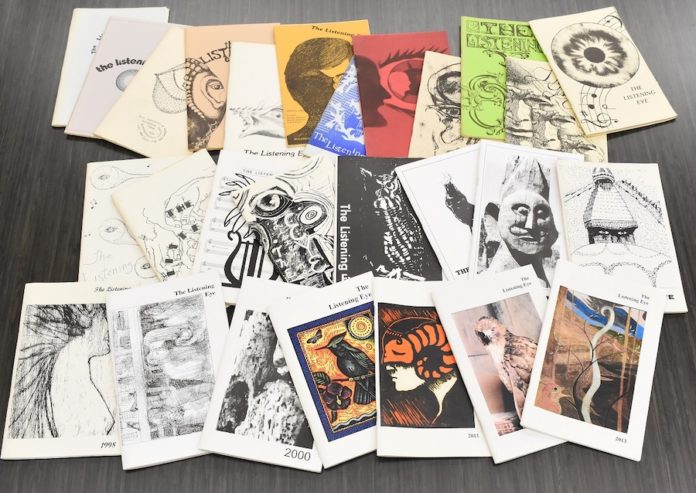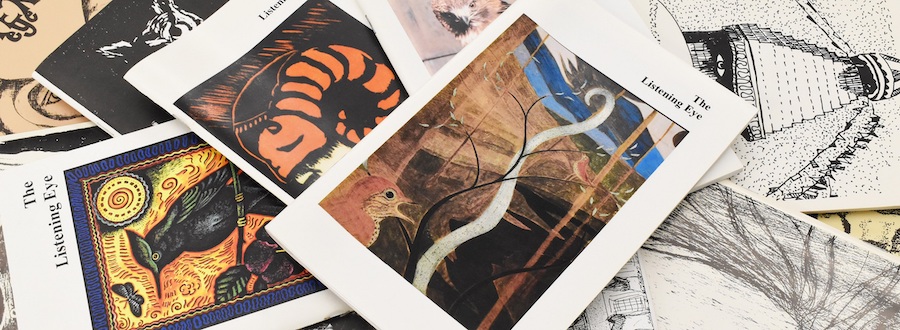By Estelle R. Brown
The Listening Eye is reawakening. This literary magazine, published by Kent State University at Geauga, has produced a new edition of original poetry, short stories, essays and artwork every year since 1970. In 2020, it paused for the first time in 50 years — as so many of us held our collective breath through the worst of COVID-19 — but a renaissance is on its way.
It’s notable to recognize how rare it is for a small campus to publish a prestigious creative writing journal, says Bonnie J. Shaker, Ph.D., Assistant Professor of English at Kent State Geauga. The nearest comparison might be Kenyon College’s Kenyon Review, which is much bigger, better funded, older and well-known.
Since April is National Poetry Month, this is a perfect time to celebrate poets and their craft, especially those who have persisted with excellence for five decades. Dr. Shaker, who recently became associate editor of The Listening Eye, says that the credit for its creation, status and longevity falls squarely on the dedicated shoulders of Kent Geauga English Professor Emerita and acclaimed poet Grace Butcher.
Professor Butcher, 87, began teaching English at Kent State Geauga in 1968. A longtime Chardon resident, she recalls, “This was back in the hippie days, during a big upsurgence of poetry readings in local coffee houses. I was part of that scene in Cleveland and wanted to bring it here, so I started a monthly poetry workshop where students and people from the community would gather to read their poems and then the audience would critique them. Since we were ‘super-cool,’ we thought that having a poetry magazine on campus was also the thing to do.”
During the journal’s formative years, when it was a set of mimeographed pages stapled together, “I told my students that I would publish ANYTHING at that time,” Prof. Butcher recalls. The journal also went by the tongue-in-cheek title, The Kent State University Geauga Campus Literary Magazine & Pancake Breakfast and/or Spaghetti Dinner.
After just a couple of issues, the title proved to be understandably cumbersome, so a contest among the student body produced its lasting metaphoric title, The Listening Eye. Ever since, the journal has adopted a chapbook-style format, with cover artwork featuring an interpretation of a listening eye.
Over the next 20 years, the hippie era faded. Along with it, students’ interest in creative writing also lagged. “We have had diminished student content from the student body for years and years since interest dwindled away in the ‘90s,” Prof. Butcher says.
In order to keep her passion project alive in the early 1990s, Prof. Butcher received permission from the Kent State Geauga dean to convert The Listening Eye into a national literary magazine, publishing poets, writers and artists from across the country. Since Prof. Butcher had already established a national network of contacts through her poetry recitations plus collegiate workshops and conferences, she had no trouble attracting “some real good names” to the publication.
As a result, The Listening Eye is listed in prestigious national directories and continues to attract quality submissions. Contests (with cash prizes) are held annually for the best cover art and the best sports poem (hearkening to Prof. Butcher’s background as a competitive runner, horsewoman and motorcyclist). Prof. Butcher plus two assistants comprise a jury that determines which submissions are worthy of publication for that year.
As with many other COVID-related pauses, The Listening Eye now has an opportunity to reconsider its mission, function and next steps. Since submissions intended for 2020 publication are still in process, the 2021 publication of The Listening Eye may be larger than the typical 48-50 pages. Local and student submissions are encouraged, along with the national pool of entries.
Moving forward, Dr. Shaker is generating student engagement through the campus Media Club in design, layout and production of The Listening Eye, while Prof. Butcher focuses on reviewing submissions. Dr. Shaker is also pursuing sources of funding to ensure the journal’s perpetuity. Along with the enthusiastic support of Kent State Geauga Dean Angela Spalsbury, The Listening Eye can anticipate a revitalization that could propel it forward for another 50 years.
Admittedly ”old-school,” Prof. Butcher holds an enduring aversion to digital technology. “I hate reading from a computer screen. We have stayed — lovingly — with paper for all of these years.”
Seeking entries that embody “the opposite of cliché, predictable rhyme or trite images,” Prof. Butcher wants “to learn something I didn’t know before, with language using vivid imagery that involves all five senses; not abstractions.”
She will accept email submissions at grace_butcher@msn.com but still prefers hard copy submissions mailed to The Listening Eye, 14111 Claridon Troy Rd, Burton, OH 44021. Submissions can include a maximum of four poems, one 750-word piece of creative writing, and/or a copy of an original painting, drawing or other piece of artwork that relates to the title of the literary magazine.
Look to the Poet’s Market or Writer’s Market for submission details, requirements and deadlines.























